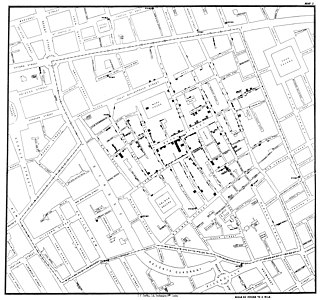Related Research Articles

Human geography or anthropogeography is the branch of geography which studies spatial relationships between human communities,cultures,economies,and their interactions with the environment,examples of which include urban sprawl and urban redevelopment. It analyzes spatial interdependencies between social interactions and the environment through qualitative and quantitative methods.This multidisciplinary approach draws from sociology,anthropology,economics,and environmental science,contributing to a comprehensive understanding of the intricate connections that shape lived spaces.
Territorial integrity is the principle under international law where sovereign states have a right to defend their borders and all territory in them from another state. It is enshrined in Article 2(4) of the UN Charter and has been recognized as customary international law. Under this principle,forcible imposition of a border change is an act of aggression.
Regional science is a field of the social sciences concerned with analytical approaches to problems that are specifically urban,rural,or regional. Topics in regional science include,but are not limited to location theory or spatial economics,location modeling,transportation,migration analysis,land use and urban development,interindustry analysis,environmental and ecological analysis,resource management,urban and regional policy analysis,geographical information systems,and spatial data analysis. In the broadest sense,any social science analysis that has a spatial dimension is embraced by regional scientists.

Economic geography is the subfield of human geography that studies economic activity and factors affecting it. It can also be considered a subfield or method in economics. There are four branches of economic geography.

Urban geography is the subdiscipline of geography that derives from a study of cities and urban processes. Urban geographers and urbanists examine various aspects of urban life and the built environment. Scholars,activists,and the public have participated in,studied,and critiqued flows of economic and natural resources,human and non-human bodies,patterns of development and infrastructure,political and institutional activities,governance,decay and renewal,and notions of socio-spatial inclusions,exclusions,and everyday life. Urban geography includes different other fields in geography such as the physical,social,and economic aspects of urban geography. The physical geography of urban environments is essential to understand why a town is placed in a specific area,and how the conditions in the environment play an important role with regards to whether or not the city successfully develops. Social geography examines societal and cultural values,diversity,and other conditions that relate to people in the cities. Economic geography is important to examine the economic and job flow within the urban population. These various aspects involved in studying urban geography are necessary to better understand the layout and planning involved in the development of urban environments worldwide.
Feminist geography is a sub-discipline of human geography that applies the theories,methods,and critiques of feminism to the study of the human environment,society,and geographical space. Feminist geography emerged in the 1970s,when members of the women's movement called on academia to include women as both producers and subjects of academic work. Feminist geographers aim to incorporate positions of race,class,ability,and sexuality into the study of geography. The discipline was a target for the hoaxes of the grievance studies affair.
An ethnocracy is a type of political structure in which the state apparatus is controlled by a dominant ethnic group to further its interests,power,dominance,and resources. Ethnocratic regimes in the modern era typically display a 'thin' democratic façade covering a more profound ethnic structure,in which ethnicity –and not citizenship –is the key to securing power and resources.
A județ is an administrative division in Romania,and was also used from 1940 to 1947 in the Moldavian Soviet Socialist Republic and from 1998 to 2003 in Moldova.

The American Association of Geographers (AAG) is a non-profit scientific and educational society aimed at advancing the understanding,study,and importance of geography and related fields. Its headquarters is located in Washington,D.C. The organization was founded on December 29,1904,in Philadelphia,as the Association of American Geographers,with the American Society of Professional Geographers later amalgamating into it in December 1948 in Madison,Wisconsin. As of 2020,the association has more than 10,000 members,from nearly 100 countries. AAG members are geographers and related professionals who work in the public,private,and academic sectors.

British nationalism asserts that the British are a nation and promotes the cultural unity of Britons,in a definition of Britishness that may include people of English,Scottish,Welsh,and Irish descent. British nationalism is closely associated with British unionism,which seeks to uphold the political union that is the United Kingdom,or strengthen the links between the countries of the United Kingdom.
Yehua Dennis Wei is a Chinese-American geographer. He is a professor in the Department of Geography and a senior scholar in the Institute of Public and International Affairs at the University of Utah. His research has been funded by the NSF,Lincoln Institute of Land Policy,National Geographic Society,Ford Foundation and Natural Science Foundation of China (NSFC). He has received awards for research excellence from the NSFC,Association of American Geographers' (AAG) China,Asian and Regional Development and Planning Specialty Groups,and University of Wisconsin-Milwaukee.
Jennifer R. Wolch is a professor of Urban Planning,Geography and former dean of the UC Berkeley College of Environmental Design.

Eric Sheppard is a British and American geographer,and Professor of Economic geography at UCLA.

Congolese nationalism in the Democratic Republic of the Congo was also for a time known as Zairian nationalism during the rule of Mobutu Sese Seko. Congolese nationalism persists among the people of the Democratic Republic of the Congo,in spite of civil war and the lack of a clear definition of what it means to be Congolese.
Kevin R. Cox is an Anglo-American geographer,who holds the position of Distinguished University Professor,in the Department of Geography,of The Ohio State University
William Arthur Valentine Clark is Distinguished University Research Professor in the Geography Department at the University of California,Los Angeles. His research focuses on housing markets and residential mobility and migration,and the impacts of local residential change on neighborhood outcomes,including segregation and ethnic and racial patterns.
Environmental,ecological or green gentrification is a process in which cleaning up pollution or providing green amenities increases local property values and attracts wealthier residents to a previously polluted or disenfranchised neighbourhood. Green amenities include green spaces,parks,green roofs,gardens and green and energy efficient building materials. These initiatives can heal many environmental ills from industrialization and beautify urban landscapes. Additionally,greening is imperative for reaching a sustainable future. However,if accompanied by gentrification,these initiatives can have an ambiguous social impact. For example,if the low income households are displaced or forced to pay higher housing costs. First coined by Sieg et al. (2004),environmental gentrification is a relatively new concept,although it can be considered as a new hybrid of the older and wider topics of gentrification and environmental justice. Social implications of greening projects specifically with regards to housing affordability and displacement of vulnerable citizens. Greening in cities can be both healthy and just.

Mei-Po Kwan is a geographer known for her research contributions in Geographic Information Science,and human geography,particularly as they apply to time geography and human mobility. She is the Choh-Ming Li Professor of Geography and Resource Management at The Chinese University of Hong Kong (CUHK),Director of the Institute of Space and Earth Information Science (ISEIS) of CUHK,Director of the Institute of Future Cities of CUHK,and Head of Chung Chi College of CUHK.

Spaces of Hope is a book by British Marxist geographer David W. Harvey. It was published in 2000 by the Edinburgh University Press.
Geraldine Pratt is a Canadian geographer,researcher,and professor.
References
- 1 2 3 4 5 "David H. Kaplan | Kent State University". www.kent.edu.
- ↑ "David H. Kaplan". scholar.google.com.
- ↑ Staff Writer. "KSU professor named VP of American Association of Geographers". Record-Courier.
- 1 2 "2023 AAG Awards Recognition". AAG. January 11, 2023.
- ↑ Kano, Krista S. "KSU geography professor elected president of international association". Record-Courier.
- ↑ "AAG 2023 David Kaplan's Past President's Address". YouTube .
- ↑ "Council Members – American Geographical Society | Since 1851".
- ↑ "Homepage". Race, Ethnicity, and Place.
- ↑ "Geographical Review". Taylor & Francis.
- ↑ "Exploring Geography | Rowman & Littlefield". rowman.com.
- ↑ "National Identities". Taylor & Francis.
- ↑ Barker, Briana. "Kent State sees success with environmental studies". Record-Courier.
- ↑ Herb, Guntram Henrik; Kaplan, David H. (1999). Nested identities : nationalism, territory, and scale. ISBN 9780847684670.
- ↑ Herb, Guntram H.; Kaplan, David H. (4 October 2017). Scaling Identities: Nationalism and Territory. ISBN 9781442264779.
- ↑ Diener, Alexander C. (2020). "Scaling Identities: Nationalism and Territory". The AAG Review of Books. 8: 15–18. doi: 10.1080/2325548X.2020.1689045 . S2CID 213005819.
- ↑ Illés, Tamás (December 20, 2018). "Herb, G.H. and Kaplan, D.H. (eds.): Scaling Identities: Nationalism and Territoriality". Hungarian Geographical Bulletin. 67 (4): 401–404. doi: 10.15201/hungeobull.67.4.9 . S2CID 149881350 – via ojs.mtak.hu.
- ↑ "Reviewed Work – Scaling Identities: Nationalism and Territoriality by Herb Guntram H., Kaplan David H." JSTOR 26570137.
- ↑ "Reviewed Work – Nations and Nationalism: A Global Historical Overview by Guntram H. Herb, David H. Kaplan". JSTOR 20865104.
- ↑ Herb, Guntram H.; Kaplan, David H. (22 May 2008). Nations and Nationalism: A Global Historical Overview. ISBN 9781851099085.
- ↑ Kaplan, David H. (2004). "Ethnic Segregation: Measurement, Causes, and Consequences". World Minds: Geographical Perspectives on 100 Problems. pp. 151–156. doi:10.1007/978-1-4020-2352-1_25. ISBN 978-1-4020-1613-4.
- ↑ Teixeira, Carlos (2019). "Navigating ethnicity: Segregation, placemaking and difference, by David H. Kaplan". Journal of Urban Affairs. 41 (3): 411–413. doi: 10.1080/07352166.2018.1507218 . S2CID 158843895.
- ↑ Kaplan, David H. (1998). "Geographical Aspects of Ethnic Economies". Urban Geography. 19 (6): 487–488. doi:10.2747/0272-3638.19.6.487.
- ↑ Kaplan, David H.; Woodhouse, Kathleen (2004). "Research in Ethnic Segregation I: Causal Factors". Urban Geography. 25 (6): 579–585. doi:10.2747/0272-3638.25.6.579. S2CID 144064324.
- ↑ Kaplan, David H. (1998). "The Spatial Structure of Urban Ethnic Economies". Urban Geography. 19 (6): 489–501. doi:10.2747/0272-3638.19.6.489.
- ↑ Crump, Jeff; Newman, Kathe; Belsky, Eric S.; Ashton, Phil; Kaplan, David H.; Hammel, Daniel J.; Wyly, Elvin (2008). "Cities Destroyed (Again) For Cash: Forum on the U.S. Foreclosure Crisis". Urban Geography. 29 (8): 745–784. doi:10.2747/0272-3638.29.8.745. S2CID 144620134.
- ↑ Kaplan, David H. (2020). "Growing Sustainable Transportation in an Autocentric Community: Current Trends and Applications". Urban and Regional Planning and Development. pp. 503–514. doi:10.1007/978-3-030-31776-8_32. ISBN 978-3-030-31775-1. S2CID 214113684.
- ↑ Kaplan, David H. (2021). "Geography's Position in Education Today". The Professional Geographer. 73 (4): 608–618. doi:10.1080/00330124.2021.1906922. S2CID 236581421.
- ↑ "Kent State Distinguished Teaching Award Recipient Values Mentoring Students | Kent State University". www.kent.edu.
- ↑ "AAG Susan Hardwick Excellence in Mentoring Award". AAG.